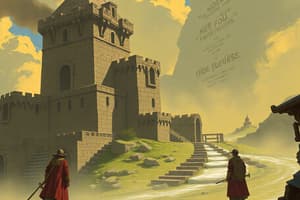Podcast
Questions and Answers
What role does a historian play in relation to the past?
What role does a historian play in relation to the past?
- To create fictional narratives about historical figures
- To memorize events as they occurred
- To preserve artifacts without studying them
- To analyze and interpret historical sources (correct)
Which of the following best describes the types of thinking skills used by historians?
Which of the following best describes the types of thinking skills used by historians?
- Chronological, analytical, critical, and historical thinking (correct)
- Chronological, imaginative, and speculative thinking
- Linear, inductive, and conjectural thinking
- Descriptive, narrative, and evaluative thinking
What is the significance of determining the credibility and reliability of evidence in historical research?
What is the significance of determining the credibility and reliability of evidence in historical research?
- It allows historians to gather more sources for their narratives
- It helps historians tell more interesting stories
- It is necessary only for academic publications
- It enables historians to accurately interpret past events (correct)
Why might historians be compared to detectives?
Why might historians be compared to detectives?
What does studying history help us learn about society?
What does studying history help us learn about society?
What are artifacts?
What are artifacts?
What does the term 'cause' refer to?
What does the term 'cause' refer to?
Define critical thinking in the context of social studies.
Define critical thinking in the context of social studies.
What is the meaning of 'effect' in historical studies?
What is the meaning of 'effect' in historical studies?
What does inquiry mean in the context of social studies?
What does inquiry mean in the context of social studies?
What are oral histories?
What are oral histories?
Which of the following is considered a primary source?
Which of the following is considered a primary source?
What do historians analyze to understand the past?
What do historians analyze to understand the past?
The process of examining evidence to determine its credibility and reliability is known as _____ thinking.
The process of examining evidence to determine its credibility and reliability is known as _____ thinking.
Flashcards are hidden until you start studying
Study Notes
Role of Historians
- Historians resemble detectives in their quest to uncover and answer questions about past societies.
- Studying history reveals insights into a society's culture, beliefs, and economy.
- They identify, analyze, and evaluate different sources to construct an understanding of historical events and contexts.
Historical Thinking
- Engaging in historical study involves thinking like a historian and critically gathering information from various sources.
- It is important to assess the credibility and reliability of the evidence being examined.
- Key types of historical thinking skills include:
- Chronological Thinking: Understanding the sequence of events and their timing.
- Analytical Thinking: Examining information and drawing conclusions from it.
- Critical Thinking: Evaluating sources and arguments to distinguish fact from opinion.
- Historical Thinking: Integrating context, perspective, and multiple viewpoints into the study of history.
Introduction to Social Studies Skills
- Essential question focuses on how social studies skills enhance comprehension of history and the past.
Key Vocabulary
- Artifacts: Human-made objects that provide insights into past civilizations and their development.
- Cause: An event that triggers another event to occur.
- Critical Thinking: The ability to identify individuals, objects, and events by analyzing their characteristics.
- Effect: The result or consequence of an event that has taken place.
- Inquiry: A method of investigating problems or seeking additional information.
Historical Sources
- Oral Histories: Recorded interviews with individuals who experienced past events, captured on audio or video.
- Primary Sources: Firsthand artifacts created by individuals who directly observed or experienced an event.
- Secondary Sources: Artifacts produced by those who have studied primary sources and provided their interpretation.
Thinking Like a Historian
- Historians function similarly to detectives, asking questions and gathering information to understand the past.
- They analyze various types of evidence for credibility and reliability.
- Historians’ research delves into a society's culture, beliefs, and economy.
- Various historical thinking skills include chronological, analytical, critical, and historical thinking.
- Understanding the context of events is key to historical analysis.
Studying That Suits You
Use AI to generate personalized quizzes and flashcards to suit your learning preferences.




